Global Warming and Cold Winters
Posted on 15 January 2011 by D.Salmons
Guest post by D.Salmons
If you were to look out most windows as of this writing, there is a good chance that you would be presented with an image of winter. All around me, winter has sprung, dumping measurable inches of frozen precipitation and snarling the usual habits of work and school as we struggle to cope with its effects on modern life. And more than a few of you might be asking yourself, "What happened to global warming?"
Well, the effects of global warming are all around us. That harsh winter that we are experiencing, it is not proof that global warming is not happening, but rather serves as proof that it is indeed happening, and even a bit faster than we might like to think. It also shows why the phrase "Climate Change" is a better term to describe the effects of man on his environment.
Vladimir Petoukhov, a climate scientist at the Potsdam Institute for Climate Impact Research, has recently completed a study on the effect of climate change on winter. According to Petoukhov,
These anomalies could triple the probability of cold winter extremes in Europe and northern Asia. Recent severe winters like last year's or the one of 2005-06 do not conflict with the global warming picture, but rather supplement it.But how does a colder winter support the idea of a warming earth? It's really simple when you look at the evidence.
Radiative Force Creates Warming
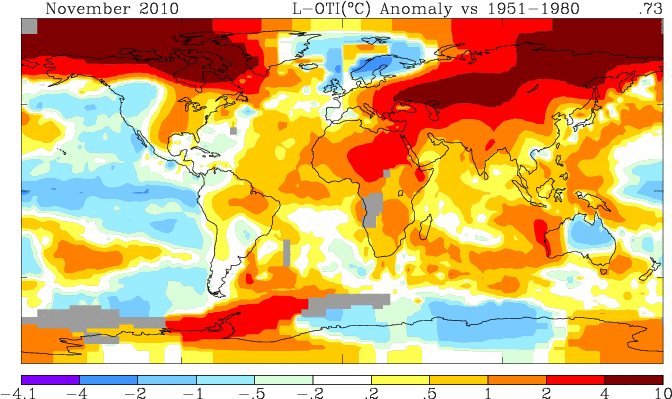
If we look at the Nasa Map above, it shows that the Arctic has been heating up, and studies show that is happening at two to three times the global average. This rising temperature in the Arctic has served to reduce the region's floating ice layer by more than 20%. And as you would expect, when the reflective ice and snow layer is stripped away, it leaves a dark blue sea.
Now, what does the effect of the dark blue sea being exposed have on the Arctic area? Well, the ice and snow layer reflects the majority of the sun's rays harmlessly back into space. But the dark blue of the exposed sea absorbs the rays, aiding the heating process.
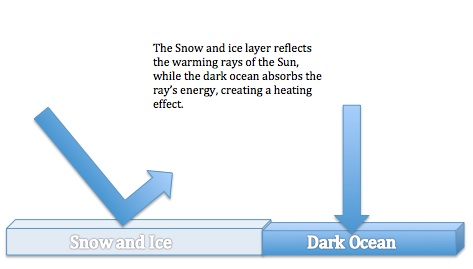
In short, as the ice shelf shrinks, the Arctic region becomes a better collector of the Sun's energy, speeding up the warming effect and creating an even wider solar collector from the exposed sea. It should be easy to see how the process accelerates itself.
Global Pressure creates Arctic Corridor
As the ocean gets warmer from the radiative force of the Sun's rays, it is in marked contrast with the polar air above it. The heat from the warmed ocean flows upward into the polar air, creating a high pressure system.
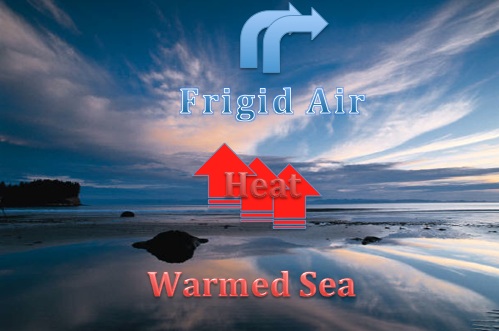
This high pressure forces the polar air to move, and soon we have a clockwise swirl that pushes frigid air downwards into Europe and across the globe.
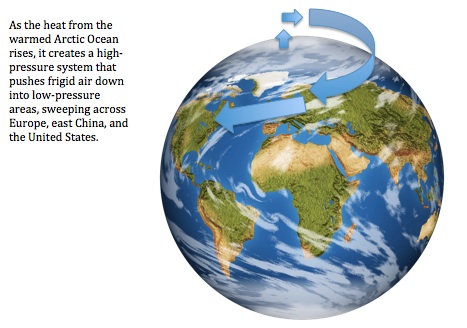
This newly formed "Arctic Corridor" pushes the frigid air from Europe into Eastern China and the Americas, dropping temperatures and making winter conditions more extreme than usual.
Records Support The Model
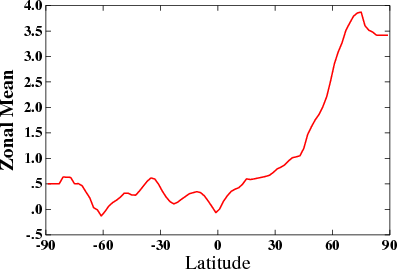
Record keeping by NASA and other institutes support the model of the artic corridor. If we look at the NASA's temperature graph by latitude, the temperature shift becomes much more pronounced as you approach the 90-degree mark. The effect, sometimes referred to in the Arctic Dipole Anomaly, explains the shift in weather patterns from established normals.
If the recent past is any indication, we can expect to see more wildly varied weather patterns and temperature shifts. In fact, we can look at the current weather season to see this shift in place. As we huddle in our abodes to avoid the effects of winter, consider that Greenland had temperatures above zero in December. Climate Change may be a very mild description indeed of what is happening to Planet Earth.
Author's bio: D. Salmons is a freelance writer and social media consultant for several companies, ranging from individuals to Fortune 500. She is a bit of a geek and enjoys writing about consumer electronics at Test Freak, a website that collects product information and reviews for the best GPS and other tech gadgets.































 Arguments
Arguments






























oilwellwindmill, get one!'